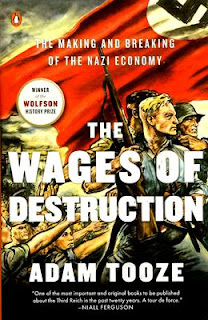The “Clockstopper” Counterfactual and the Holocaust
Recent historical writing on
the Holocaust has been filled with different kinds of counterfactual
observations. (I discuss them at
length in a forthcoming book on the memory of Nazism). Let me offer a preview by profiling one interesting type: the “clockstopper” counterfactual.
In his recent award-winning
book, The Wages of Destruction
(2007), historian Adam Tooze devotes several pages to discussing the Nazis’ brutal
policies against the Slavs during World War II, especially the regime’s
decision to allow over 3.3 million Soviet POWs to die of starvation. In this context, Tooze makes the counterfactual claim that “if the clock had been stopped in early 1942, this
programme of mass murder would have stood as the greatest single crime
committed by Hitler’s regime,” exceeding that of the Holocaust (p. 483).
Interestingly, Tooze’s claim
echoes an older one made by historian Christopher Browning in his book, The Path to Genocide (1992). In his preface (p. ix), Browning wrote:
“If the regime had disappeared in the spring of 1942, its
historical infamy would have rested on the ‘war of destruction’ against the
Soviet Union. The mass death of some two million prisoners of war in the first
nine months of that conflict would have stood out even more prominently than
the killing of approximately one- half million Jews in that same period.”
Both Tooze’s and Browning’s observations
initially appear convincing, but they are ultimately weakened by the arbitrary
quality of their counterfactual premise. In order to be convincing, a counterfactual turn of events
must have a certain degree of plausibility. By failing to explain how
World War II would have suddenly stopped -- or how the Nazi regime might have
disappeared -- in 1942, Tooze’s and Browning’s points have a decidedly artificial
and unconvincing feel to them.
It hardly merits noting that if one “stops
the clock” on any process, historical or otherwise, its outcome and ultimate
significance are altered. (To be
glib, if we take the soufflé out of the oven halfway through its
cooking time, it fails to become a soufflé).
There is no denying that our understanding
of the Nazis’ crimes will be determined by the point at which we measure them. Browning, indeed, illustrated this fact
earlier on the same page of The Path to
Genocide when he turned the clock back even further in time and observed, “If the Nazi regime
had suddenly ceased to exist in the first half of 1941, its most notorious
achievements in human destruction would have been the so-called euthanasia
killing of seventy to eighty thousand German mentally ill and the systematic
murder of the Polish intelligentsia.”
In other words, we would not view the murder of Soviet POWs as a
horrific crime because it would not yet have taken place.
But this point is obvious. The question is not whether
an event’s significance will be shaped by the point at which one stops the
clock and measures it. The
question is whether any such clockstopping was likely to take place to begin
with. If not, then the
counterfactual has a tendentious quality to it.



Comments